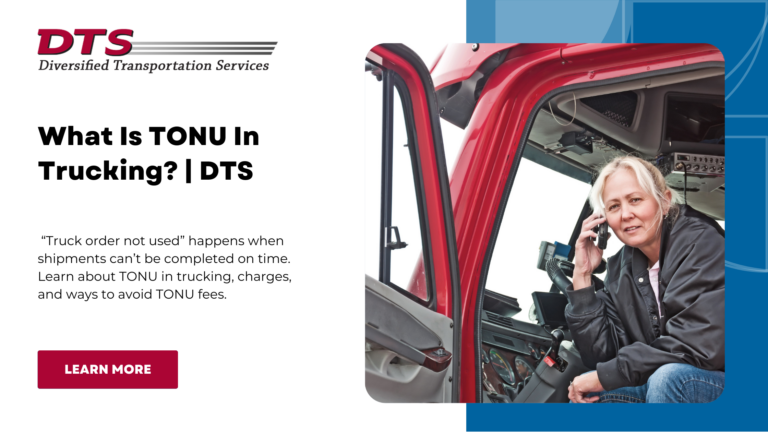
For businesses that manage daily shipments, understanding TONU in trucking is crucial to avoid unnecessary transportation costs and help ensure efficient logistics.
Arranging shipments is a daily process for countless businesses worldwide. Sending goods to customers, collecting essential materials, and performing any number of other shipping tasks require careful planning to ensure that the right items end up in the right place at the right time.
But occasionally, shipments can go wrong. A simple mistake or misunderstanding could lead to wasting valuable hours and money on unnecessary transportation. That’s where TONU and TONU charges become an issue.
If your company relies on carriers to send and receive shipments, you must understand TONU in trucking. Below, you’ll learn the essentials of TONU, trucking company charges for TONU, and how to avoid TONU fees.
TONU in trucking is an acronym for “Truck Order Not Used.” It occurs when one or more truck drivers are unable to complete a task agreed on with the customer. That may mean a truck arrives at a pick-up location on time to collect a shipment, only to find that the items or customer (possibly both) are not where they should be.
TONU in trucking may be used for a number of reasons, including:
No matter the reason, carriers may impose a TONU charge in Truck Order Not Used situations.
If you hire a carrier to collect a shipment from a location but cancel the load with little to no warning, you can expect to be charged a TONU fee. Companies use TONU charges to cover losses incurred when dedicating drivers and trucks to tasks that go wrong for reasons beyond their control.
TONU costs vary but are usually around $150 for a standard van and $300 for a refrigerated truck or other specialized equipment. Charges may be applied within a short period of time, even just a few hours after a late cancellation or pickup failure.
TONU in trucking is a big issue, and nobody wants to pay TONU charges. Carriers invest time, energy, and resources into transporting shipments, so it’s not surprising that they charge customers in a Truck Order Not Used situation. However, you can take certain steps to avoid paying TONU charges in the future.
Plan shipments in detail to ensure everything is in place and minimize the risk of mistakes. Plan dates and times as early as possible, and then keep a record of them in an easily accessible place.
Everyone who needs to know when and where a collection/delivery is happening should be aware from the start. That means potential issues can be addressed sooner rather than later, allowing for rescheduling.
Proper communication is a must to reduce oversights and misunderstandings. Discuss all possible changes with your carrier in good time, whether you’re concerned that a shipment won’t be ready on the intended date or you believe an order may be larger than expected.
Keeping your carrier updated will help them better plan their drivers’ routes and assign the best trucks/equipment for the job. If you fail to communicate transparently with a carrier, things may not go as planned, which could lead to costly TONU charges.
Your chosen carrier should be upfront and clear about their TONU policy. Reputable companies will provide information on how they enforce TONU trucking charges, so don’t be afraid to ask. For example, they may specify that a pickup or delivery should be canceled at least 24 hours before the agreed time.
Explicit Truck Order Not Used policies are vital to avoid disagreements surrounding cancellations and charges. Do your research when choosing carriers so you know what to expect in the event of any complications.
When working with any shipping provider, aim to avoid “Truck Order Not Used” issues as best you can. Plan diligently, communicate often, and research TONU policies to prepare for potential charges if you cause a truck to go unused.
Learn more about other key trucking and shipping terms at the DTS blog. We cover a wide range of topics and provide you with insights into this complex area.
If you need to arrange domestic or international shipping at any time, get in touch with DTS for freight advice and services today.
Whether you're a company looking to improve one facet of your supply chain, your entire supply chain, or simply looking for a transportation and logistics consultation, we can help.